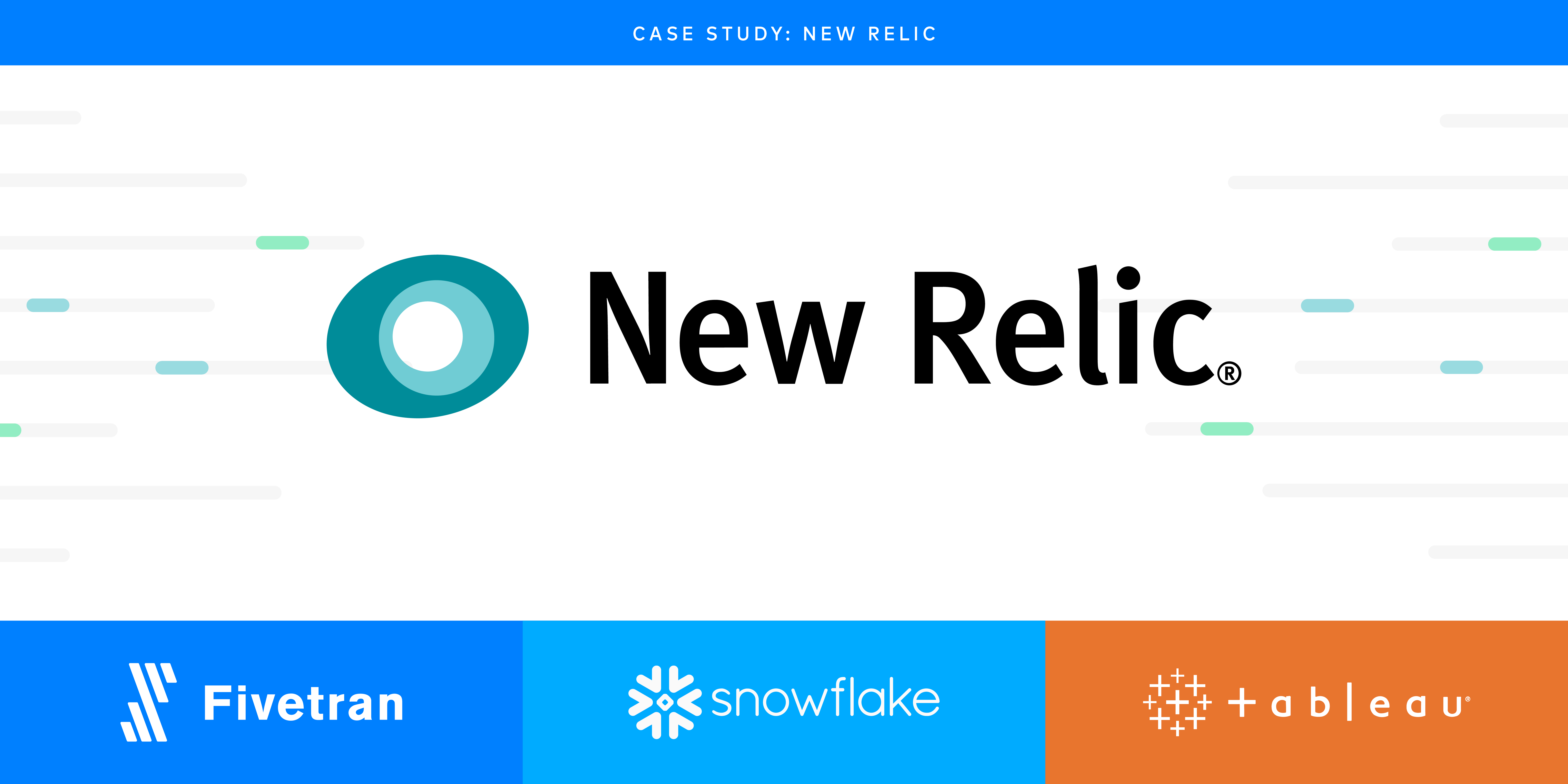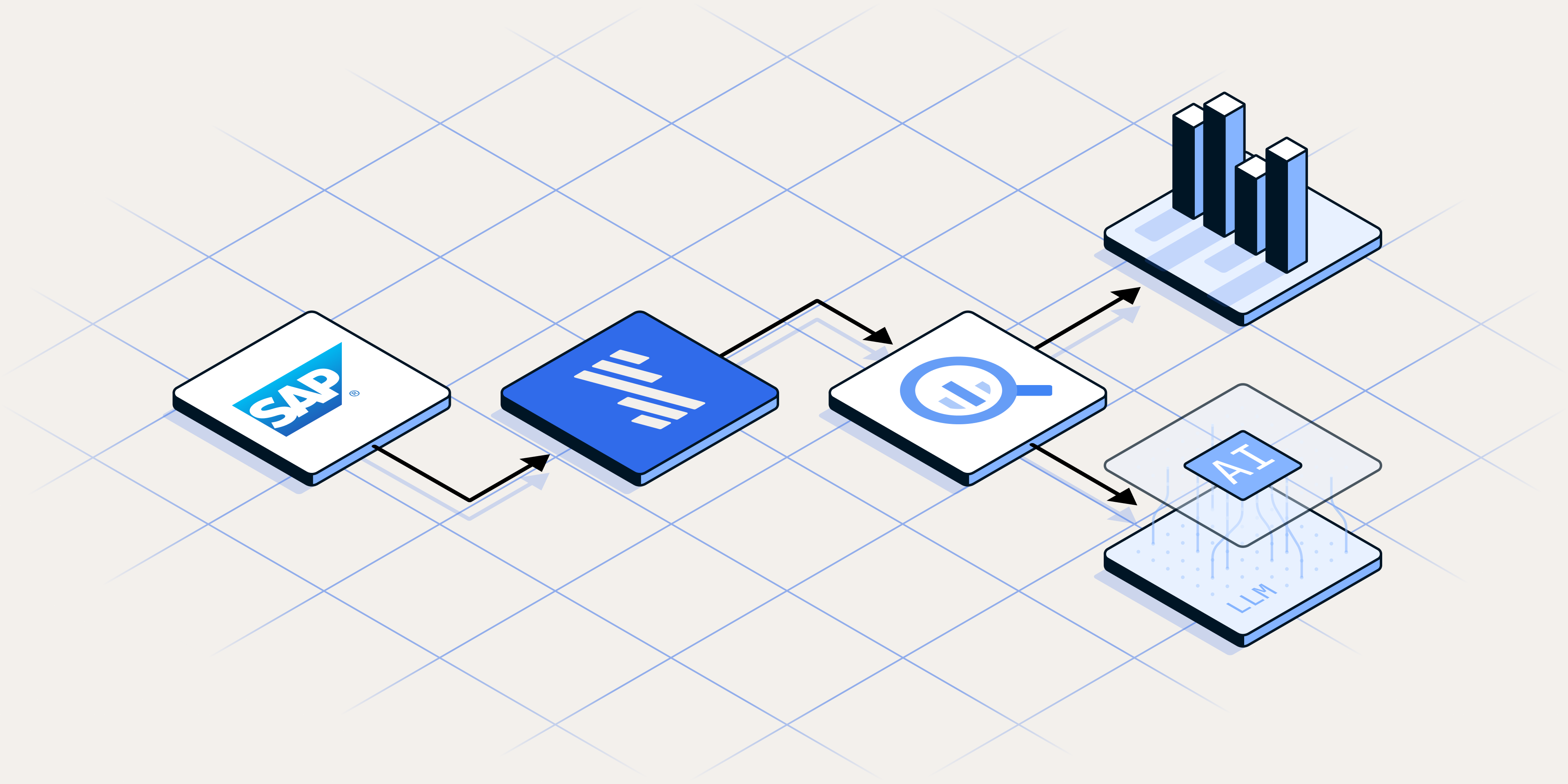Key Takeaways
- Replaces previous process of manually integrating data into Anaplan (the company’s improvised data warehouse) with Fivetran and Snowflake
- Joins centralized financial data with product data to improve visibility into renewal and growth opportunities
- Fivetran saves the business from needing an additional three to five data engineers to write and maintain its most heavily used schemas – an estimated savings of nearly half a million dollars
- Plans to more efficiently identify accounts benefiting from its new pricing model, driving revenue and conversions that would otherwise have been left on the table
Data Stack
- Data Integration: Fivetran
- Sources: Fivetran Log Connector, Google Sheets, Salesforce, Workday, Zuora
- Destination: Snowflake
- Business Intelligence: Tableau, Periscope
Improving Financial Processes & Product Led Growth Metrics
New Relic enables observability at scale. Its cloud-based solutions give developers, engineers, operations and management a clear view of what is happening in complex software environments. As a mission-critical solution to over 17,000 global customers, New Relic needs confidence in its internal software choices.
The business had been using a previous solution for data integration, but experienced serious issues with its Salesforce pipeline and saw a significant drop in support. Multiple stakeholders had used Fivetran at previous companies, including Erik Jones, now Director of Product Analytics at New Relic, and knew it was the most reliable ELT solution in the market.
At New Relic, one of Jones’ responsibilities is to provide insight on the company’s product led growth initiatives, including conversion rates, revenue and the migration from a legacy pricing model to a new pricing model, which requires joining product and finance data. Existing financial processes, however, hindered the flow of real-time, accurate data for product analytics.
Modernizing Finance Analytics: From Excel to Dynamic Dashboards
Ed Fu, FP&A Manager at New Relic, first recognized the issues with the manual processes and approached the analytics team with his challenges:
We [the finance team] are all Excel gurus with a lot of manual processes. We download raw data files from sources like Zuora, transform it and upload it into Anaplan for forecasting. Anaplan isn’t designed to house all of this data, so we ran into space constraints and system limitations. We knew we had to take advantage of our centralized data warehouse to store the data and transformations, replace our Excel processes and free up space in Anaplan.
In short, data was manually extracted from Zuora and Salesforce, then transformed and uploaded manually into Anaplan, where further transformations were done. The output was information for ARR reporting, net new logos, and logos lost. These monthly snapshots were the basis for monthly ARR reporting going back to 2012. Anaplan was functioning as a data warehouse, which Jones knew was problematic:
We faced a scalability issue. We were running out of compute power in Anaplan. We wanted to get out of a month-end close process where we were reliant on a manual, non-database application to do transformations. We needed to use Anaplan for budgeting and forecasting, not as a warehouse.
While Fu didn’t know what Fivetran was, he was sold on the promise of dynamic reports in the warehouse. He worked with Senior Data Analyst, Paige Berry on the project and as a result, has consolidated and automated financial reporting with a single source of truth for revenue numbers – something that the business never had before. For Berry, using Fivetran to get there was incredibly easy:
The core of this project was moving data from auxiliary systems into a central location for a single source of truth. Without Fivetran, this would have been a very long and painful process. Data extraction and loading can often be the most time-consuming part of a project. In this case, it was so quick and easy it was almost scary.
A critical component of the project was ensuring that all dashboards and reports abide by the laws of accounting. Using Fivetran, the business was able to schedule a very specific data refresh, which, as Ed shares, was essential:
We’re governed by the laws of accounting, so we had to ensure we could get a particular timestamp for specific reports. We achieved that and now our end-user reports in Tableau give us a lot more flexibility in dashboarding without having to deal with the intricacies of pivoting tables, writing formulas and more.
By eliminating manual reporting the analytics team hopes to save the finance team endless hours at month, quarterly and year-end close. For Berry, the automation is a no-brainer:
When reports are manual, it takes more time to ensure the numbers are accurate. If that process takes a week, that’s a week when we’re not 100% sure what the data is telling us. When it’s automated, we can know the numbers within an hour of month-end. When you get more data more quickly you can also react more quickly.
Automating Financial Data to Measure Product Analytics
The impact of automated financial reporting goes beyond finance teams. Real-time, accurate financial information helps inform product-led growth and other decisions throughout the business.
As part of its product-led growth (PLG) initiatives, New Relic ran its first product qualified lead (PQL) automated marketing campaign. The analysts joined the amount of data ingested on a per-customer basis each month from the product with the associated rate plan and billing information data from Zuora in order to identify customers likely to benefit from the new pricing model. Those customers then received a nurture campaign communicating the benefits of conversion. The open rate and click-through rates for the initial campaign were about 5 basis points higher than the average. With this data, the business was able to drive conversion that would have otherwise been left on the table simply because it wasn’t connecting its product data with its billing information.
Data-Driven Customer Success & Growth
A renewal migration dashboard includes Zuora billing data that shows which pricing model the customer is on – the legacy subscription model versus the new pay-as-you-go or annual subscription models – and the ARR before and after the renewal. The business is now able to accurately report on customers who renewed to the new pricing model. Jones shares that having this level of visibility has been a game-changer for the business:
With a data-driven approach we’re identifying customers that may have otherwise fallen through the cracks for renewal recommendations and growth opportunities. It’s the first time that we’ve had this level of granularity and visibility into our business and its guiding decisions across all levels of the business: from our customer success team, to our CEO and our new Chief Customer Officer.
Meeting Goals While Saving Time and Resources
With the modern data stack, New Relic can scale more efficiently and put resources to better use. For instance, the Data Engineering team has spun off an Analytics Engineering team tasked with creating denormalized views for use throughout the company. Dedicating engineering resources towards mission-critical business challenges is an important goal for New Relic, as Jones shares:
If we were to write our own API calls for our most used connectors, it would take three to five data engineers to write and maintain our most heavily used schemas. That’s a direct cost of about half a million for a team whose sole purpose would be to write ETL/ELT code. The indirect cost is having a team of data engineers doing rote ETL work that they don’t want to do when they could be optimizing queries, developing data science pipelines, and working on other value-adding challenges.
Visit our Financial Analytics resource center to learn more. If you’d like to experience the impact of Fivetran on your financial or product reporting, start your free trial today.
About Fivetran: Shaped by the real-world needs of data analysts, Fivetran technology is the smartest, fastest way to replicate your applications, databases, events and files into a high-performance cloud warehouse. Fivetran connectors deploy in minutes, require zero maintenance, and automatically adjust to source changes — so your data team can stop worrying about engineering and focus on driving insights.
About New Relic: The world’s best engineering teams rely on New Relic to visualize, analyze, and troubleshoot their software. New Relic One is the most powerful cloud-based observability platform built to help organizations create more perfect software. Learn why developers trust New Relic for improved uptime and performance, greater scale and efficiency, and accelerated time to market at newrelic.com.
About Snowflake: Snowflake delivers the Data Cloud — a global network where thousands of organizations mobilize data with near-unlimited scale, concurrency, and performance. Inside the Data Cloud, organizations unite their siloed data, easily discover and securely share governed data, and execute diverse analytic workloads. Join the Data Cloud. https://www.snowflake.com/
About Tableau: Tableau helps people see and understand their data. The Tableau platform provides the breadth and depth of capabilities that enterprises need, and adapts to your environment with unmatched flexibility and choice, while meeting the toughest governance and security requirements. People love using Tableau because it is both powerful and intuitive. Tableau leads the industry with the most passionate user community, over 86,000 customer accounts, and a commitment to customer-focused innovation.









%20(1).png)


.svg)
.svg)
.svg)